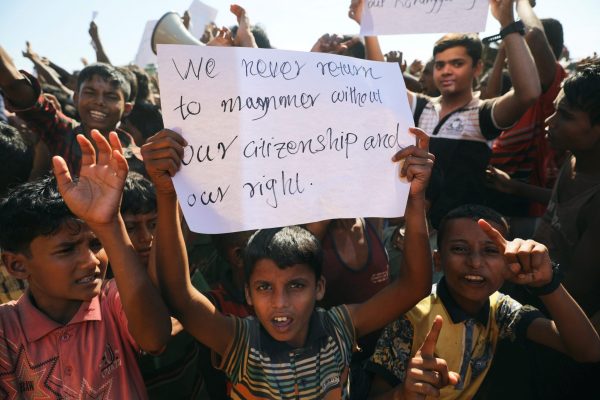The Rohingya crisis is not new. The effects of the pervasive human rights violations perpetrated against the Rohingya Muslims in Rakhine State have been negatively affecting Myanmar–Bangladesh relations for over four decades. Both governments have held a series of talks to find a solution to the recent escalation of the crisis. So far this effort has failed.
The government of Bangladesh led by Prime Minister Sheikh Hasina decided to open its border to the Rohingya in late August 2017. Hasina was concerned about how her response to the crisis would affect her prospects for re-election, with general elections tentatively scheduled at the time for late 2018 or early 2019. Later, the despair of the Rohingya population persuaded the government that opening its border was the right course of action. It was an audacious move. Mainstream British media started to refer to Prime Minister Hasina as ‘the Mother of Humanity’.
The international community, including the United Nations, has voiced its opposition to the Myanmar government’s handling of the Rohingya crisis. During the early days of the Rohingya exodus in 2017, the Myanmar government was reluctant to talk about repatriation. After facing pressure on several fronts, the government began working with Bangladesh to devise a repatriation plan. A bilateral agreement was signed on 23 November 2017 and the Joint Working Group (JWG) — a group of representatives from Bangladesh and Myanmar dedicated to overseeing the repatriation effort — was established a month later.
But progress on repatriation has been unsatisfactory. With the support of Asia’s two major powers, India and China, the Myanmar government has been able to remain largely silent about repatriation.
Both India and China have business interests in Myanmar. China is Myanmar’s biggest trading partner and biggest source of foreign direct investment. India, too, is developing its trade relations with Myanmar in pursuit of its ‘Look/Act East’ policy. Although a good friend of the Bangladesh government, New Delhi has not made its stance about the Rohingya crisis clear. What is clear is that leaders in India and China are unlikely to put too much pressure on the Myanmar government with respect to repatriation.
So what does the future hold for the Rohingya refugees?
One significant development is that Myanmar and Bangladesh have held multiple JWG meetings and visits, and through these produced a repatriation agreement in January 2018. According to the agreement, 1500 Rohingya were to be repatriated daily and all ‘eligible’ refugees were to be sent back to their homeland within two years.
But the international community expressed deep concern about two provisions of the agreement — ‘eligibility’ and ‘time-frame’. Since the Rohingya still do not have access to citizenship in Rakhine State under Myanmar’s 1982 Citizenship Law, it would not be possible for them to prove their eligibility for repatriation. They would also have to prove that they fled from Myanmar after 9 October 2016, and National Verification Cards would only be issued to those repatriated refugees who qualify under this near impossible criterion. Eligibility issues aside, it would take more than 10 years to complete the repatriation process at the agreed rate.
The government of Bangladesh handed over an initial list of 8000 qualified refugees more than six months ago. Unfortunately, the process of repatriation has been halted several times. On the day designated for repatriation to begin in November, the first group of refugees refused to go back on the grounds that they would not yet be safe.
Rohingya repatriation is unlikely to commence in the near future. The situation will not improve until the international community, including India and China, support Bangladesh on this issue. The Bangladesh government should strengthen diplomatic initiatives with India and China as well as the United States and Russia in an effort to convince them to support the government’s five-point proposal to resolve the crisis. With elections now set to take place on 30 December, it will remain a difficult task for a new Bangladeshi government to maintain, accelerate or potentially redesign the policy initiatives aimed at addressing this ongoing struggle.
For the Rohingya people, their lives remain heavily restricted and reliant on humanitarian aid. They still require written permission from government officials to leave the camps, including to go to an external hospital. Solving the Rohingya crisis is of the utmost importance for the sake of the Bangladeshi government, the international community and most critically for the Rohingya people themselves.
Pranab Kumar Panday is Professor at the University of Rajshahi, Bangladesh.


China holds the Myanmar generals’ purse-strings. China clearly isn’t interested in human rights (Uighurs), but they need regional stability for commercial reasons. They can persuade their client junta to implement a semi-autonomous federated region in Myanmar for the Rohingya, protected by UN peacekeepers. Issues of citizenship and accountability could be deferred.